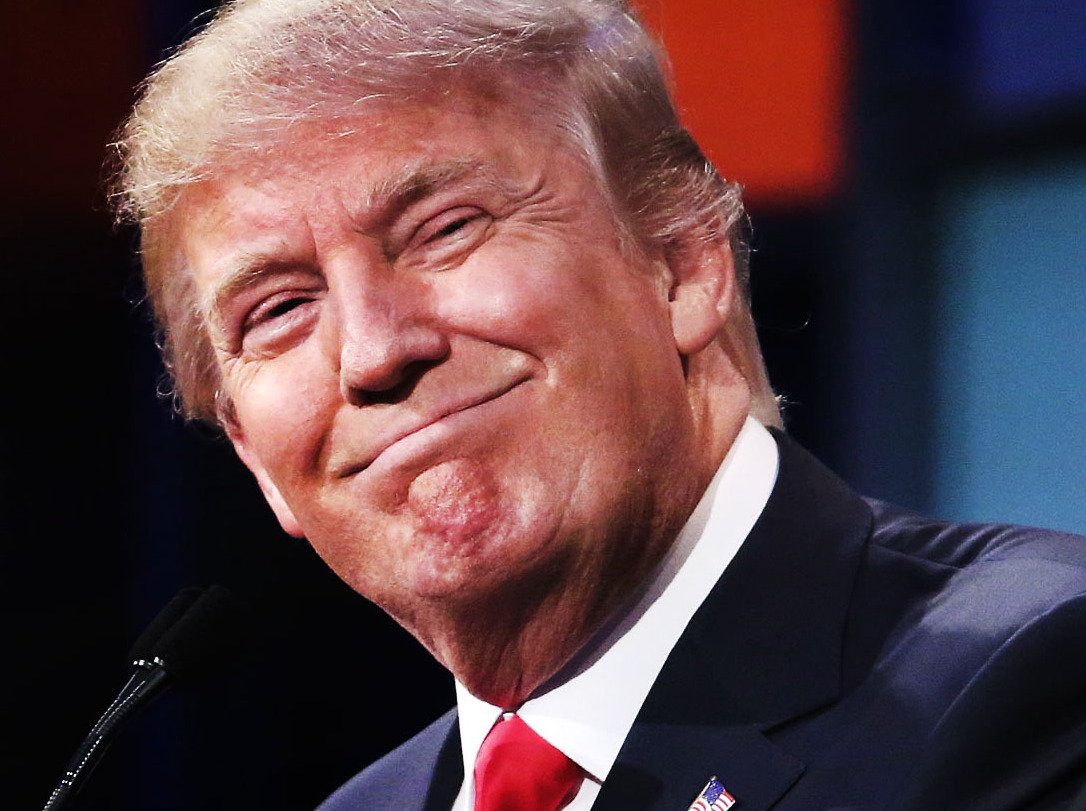This content is being reviewed in light of recent changes to federal guidance.
To trump or not to trump
 Many people would sleep better at night if Donald Trump were a cartoon character in an Aaron McGruder film. To paraphrase Ralph Ellison, Trump isn’t one of our ectoplasms; he is a human being of substance, of flesh, bone, and liquids — and he might even be said to possess a mind. He is blond, loud, and militant in giving American flavor to a wonderful Middle English document, Ayenbite of Inwit (1340), a perfect mirror for the white-faced conscience. Trump is an embarrassing gift to contemporary politics. He is the voice that asks: Why did I happen , and how does your outrage and your silence give substance to my shadow?
Many people would sleep better at night if Donald Trump were a cartoon character in an Aaron McGruder film. To paraphrase Ralph Ellison, Trump isn’t one of our ectoplasms; he is a human being of substance, of flesh, bone, and liquids — and he might even be said to possess a mind. He is blond, loud, and militant in giving American flavor to a wonderful Middle English document, Ayenbite of Inwit (1340), a perfect mirror for the white-faced conscience. Trump is an embarrassing gift to contemporary politics. He is the voice that asks: Why did I happen , and how does your outrage and your silence give substance to my shadow?
Whether they are well-educated or poorly-educated, obscenely wealthy or abjectly poor, American citizens follow instinct, custom, perverse desires, and common sense as they gaze upon and listen to the sound bites of the Donald. No politician in recent memory has been quite as inspiring as he is. Thanks to him, many people have taken to purchasing weapons and ammunition and to rereading such classic texts as Democracy in America, Candide, Mein Kaumpf, and the discredited Protocols of the Elders of Zion. Fascism is back in fashion, along with Leo Strauss, Karl Rove, Machiavelli, Henry Kissinger and the romantic realism of Alisa Zinovyevna Rosenbaum (Ayn Rand). And no one worries overmuch that, according to intelligence from the Southern Poverty Law Center, we have 892 active hate groups and 998 antigovernment groups in the United States. It would not do for the world to think the greatest country on the planet came up short in manufacturing terrorism. The great fear is that one who says Ave Trump rather than Heil Trump is politically incorrect. Or is it the other way around? It is difficult to say.
Like Facebook, Trump is a universal friend. He has a surplus of fury and sound. He signifies ad infinitum on the dread and impotence of the proverbial average American voter. Should the American democratic experiment come to an abrupt halt in November —–and I dare you to say it can’t happen, we have the option of chewing bullets and drinking James Warren “Jim” Jones Kool Aid in our self-fashioned temples. But that’s not our only option.
Before resorting to bloodshed and cheap drinks, or Arkansas barbeque with Vermont syrup, free will and our nation’s frayed racial contract do allow us remember that the love of power and money is the only God that many billionaires opt to worship. And those billionaires clone their imaginations without a scintilla of guilt. We can still recall that a trump is a playing card elevated above its normal rank in trick-taking games and that a trump, by virtue of metaphor, can be a person, a weapon, or the starting of a chain of events.
It is meaningful to reconsider how Michael Polanyi answered his rhetorical question —Are we to subscribe then to a theory of knowledge which allows the shaping of knowledge to depend on such ephemeral and parochial impulses? —in The Study of Man (1958). The impulses Polanyi had in mind were moral and civic responsibilities, the shading of those responsibilities “into political obligations, and how these in their turn form part of the established institutional framework, or else are merely the expression of political partisanship” (42). Polanyi’s answer was quintessentially British:
Surely, a judgment determined by the outcome of a struggle for power and profit cannot be accepted as authentic; as some point the acceptance of moral responsibility for the shaping of our knowledge of man will inevitably turn into an acceptance of bias, prejudice and corruption. Personal knowledge, as established by a responsible decision of the knower, degenerates here into a mere caricature of itself (42-43).
Why, we must ask, did it take us fifty-eight years to register the shock of recognition? Are American voters retarded black holes? The answer pivots on whether you decide totrump or not to trump.